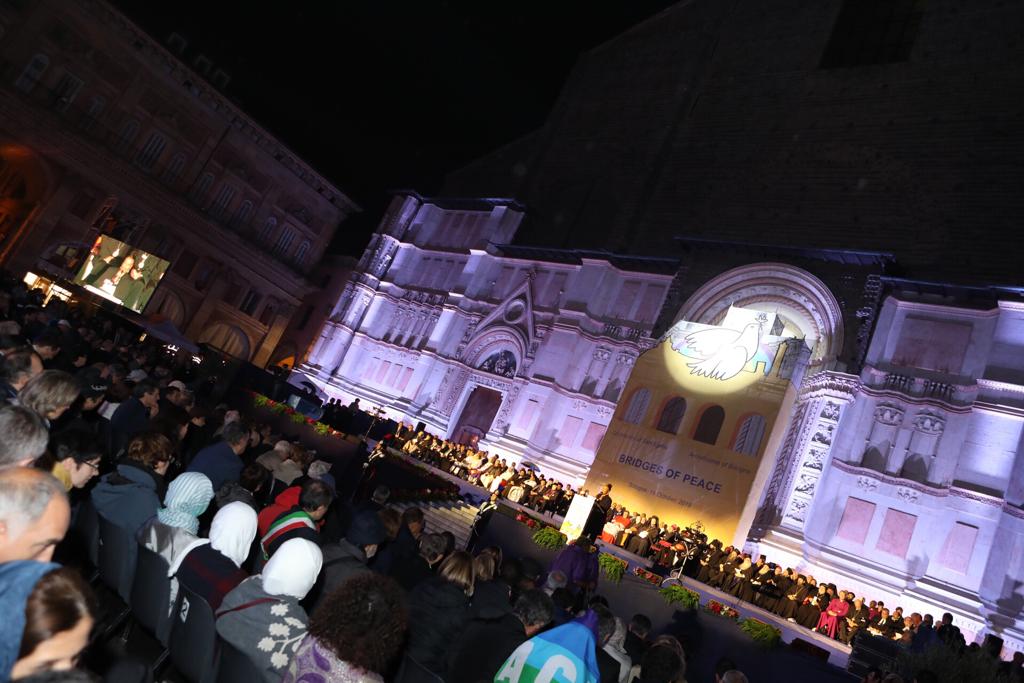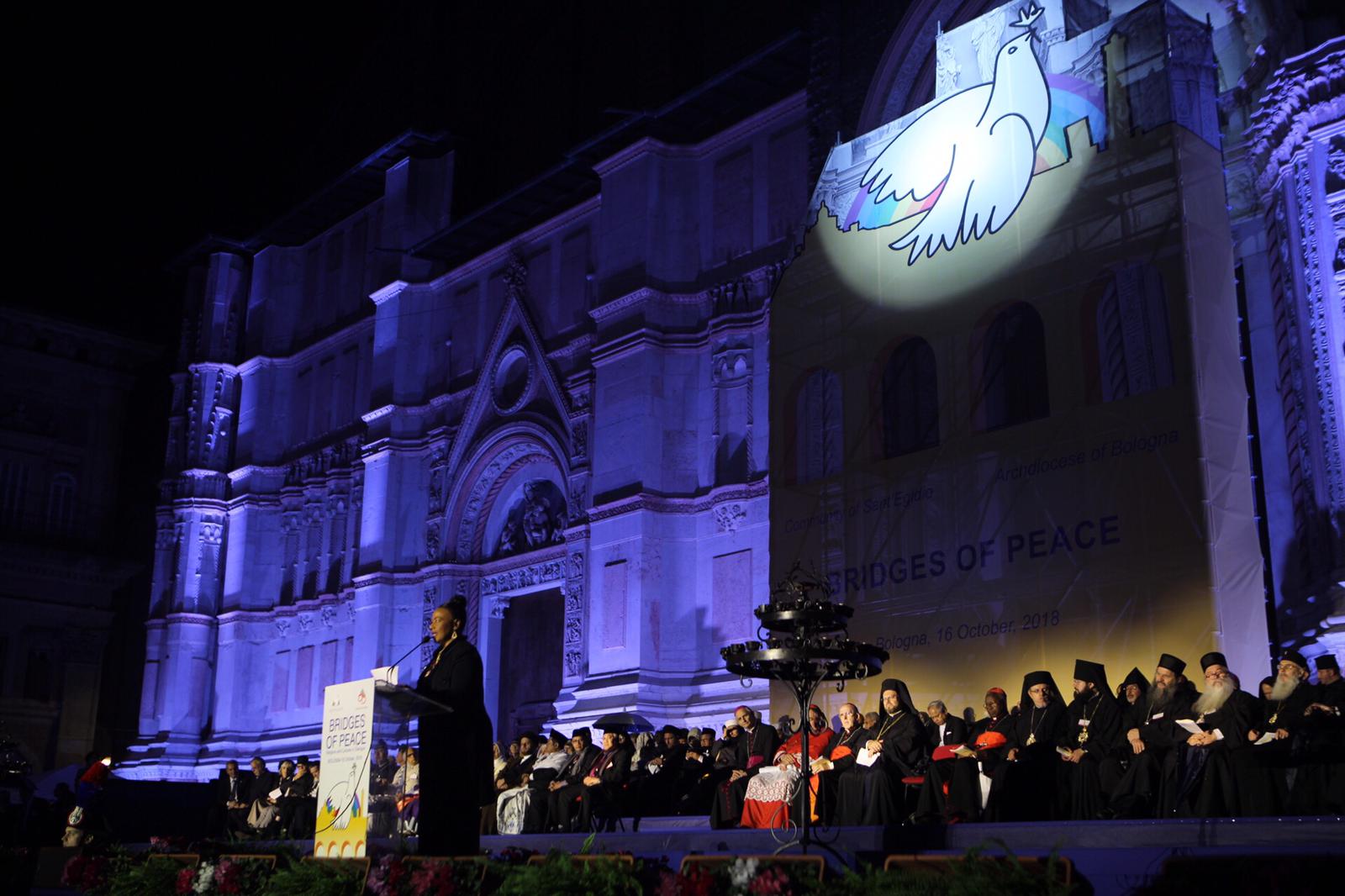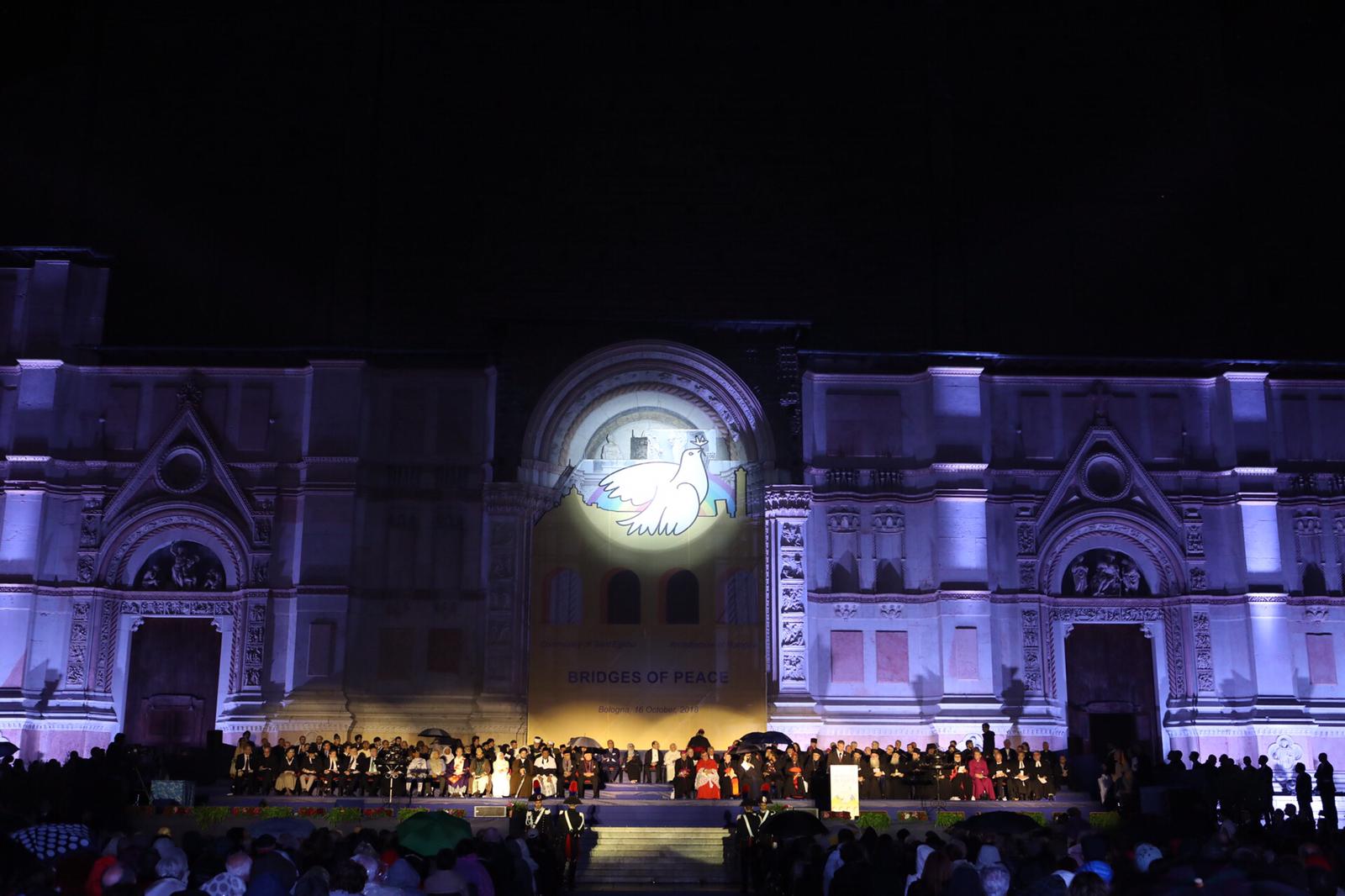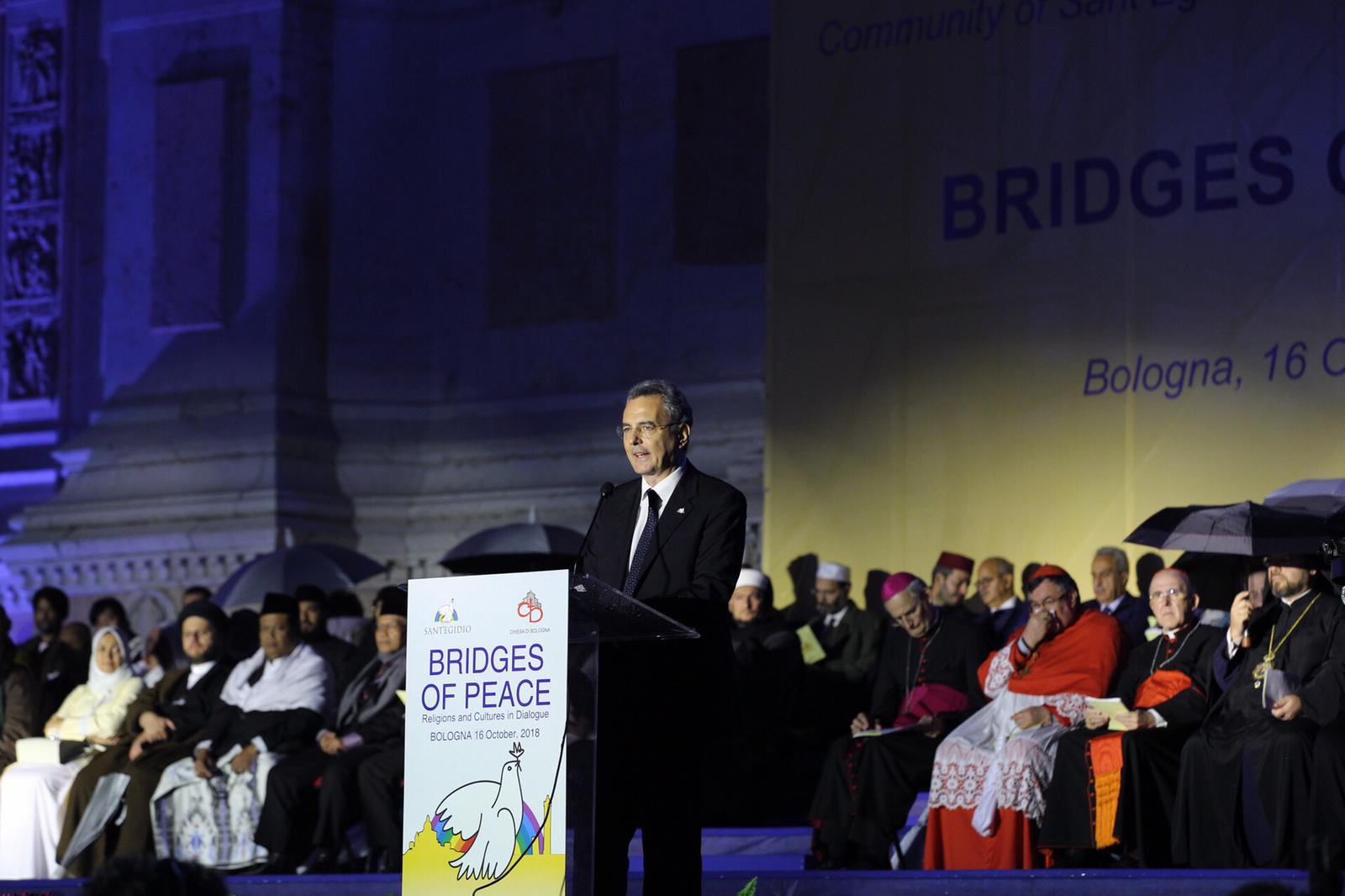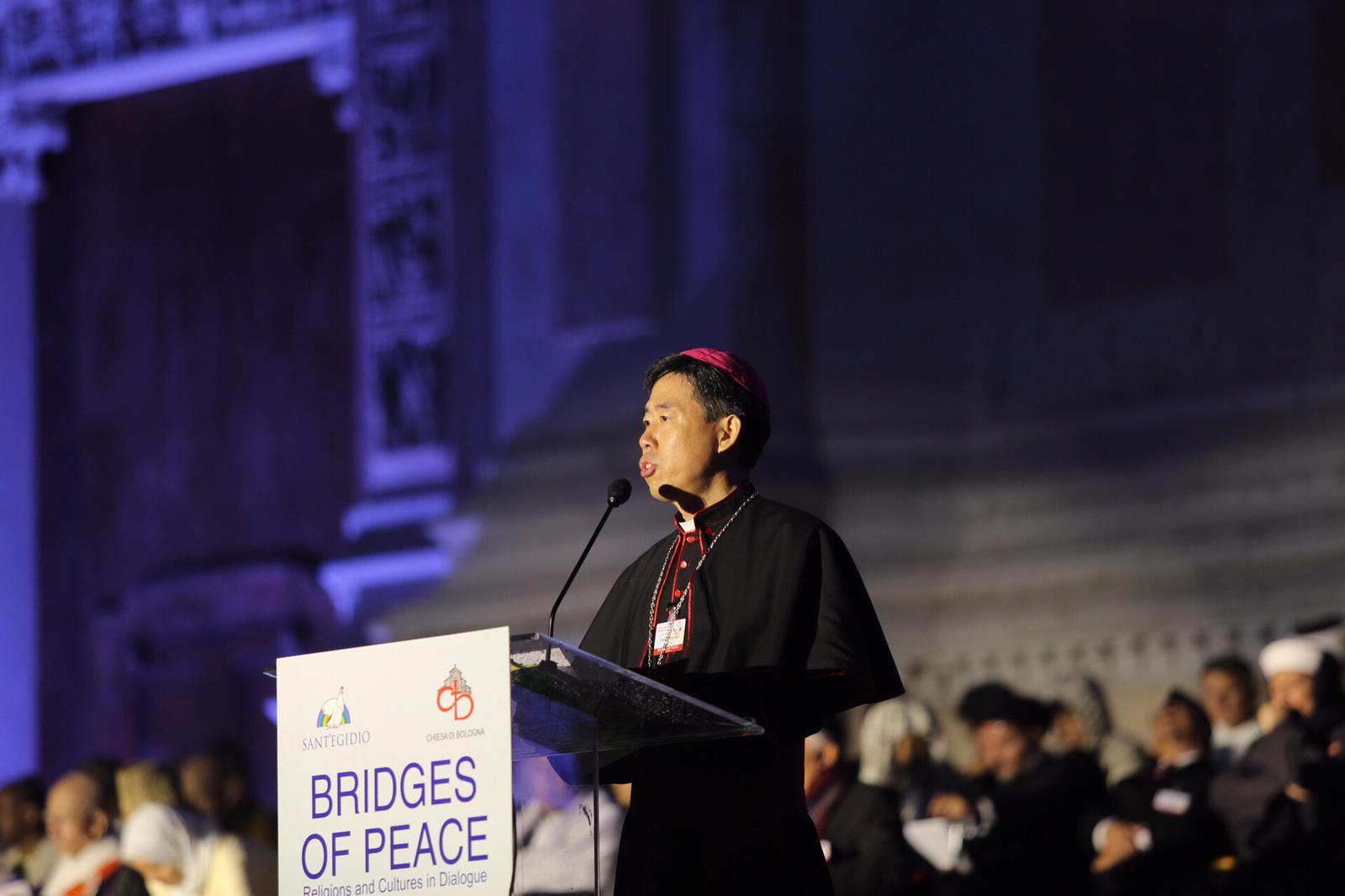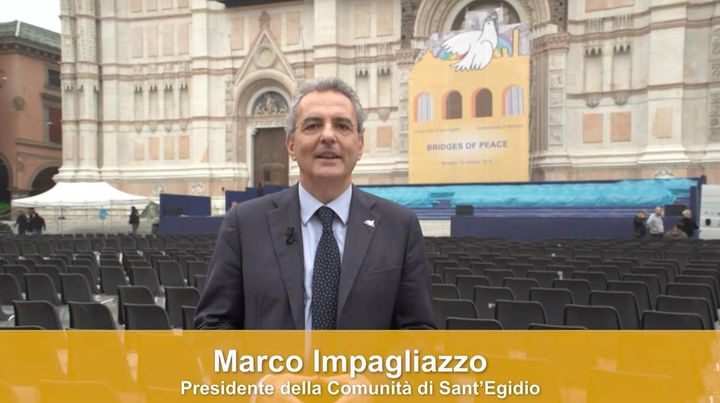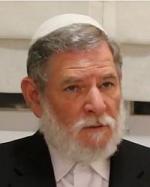
Honorable Chairman of this session, my dear friends, participants of the convention, all members of the Sant'Egidio Community, distinguished guests,
With great excitement and expectation, I sit here today at this important conference, likened to a torch of light and hope illuminating our world and giving hope and faith in the existence of inherent goodness of all people and the common wish of all mankind to achieve peace and brotherhood.
Consider Bologna, a city that has experienced many wars and conflicts, religious wars and rifts over power and control, which has become a cultural and historical center of art, education and progress for all of Europe. Similarly, we, the community of believers around the world, are confident that it is possible to impart all humanity with blessings and a message of brotherhood and peace. The basis for this position of ours is the belief in the capacity of renewing and changing, of repairing and redesigning that which exists.
In this past month of September, we, Jews in Israel and around the world, celebrated, the holiday of a New Year according to the Jewish calendar.
We believe that the day we embark on a new year, this is not merely an arbitrary date marked on the calendar. In our tradition, this is the day G-d had first created man, the crown of all creation, and had placed him in the Garden of Eden. It was also on this day that he had sinned by eating the forbidden fruit, but and this is the essence of the Jewish faith, on this very day he had also repented for his sin, and G-d had then accepted this repentance graciously and had assigned to him the most important role in the world: "Tikkun Olam" (World Correction). From this point on, one must correct every malfunction and heal every pain, eliminate all hatred and renew joy and creativity. This idea is the basis for the optimistic view towards all humanity.
It is precisely on this day of each year that we celebrate the beginning of a new year, since we believe that each person must re-examine oneself every year and one's contribution to the task for which one was created. What have you fixed to date? What are you going to fix next year?
In the Jewish tradition there is a wonderful legend about a fascinating encounter between a great Jewish sage, his name was Rabbi Akiva and an important Roman ruler whose name in legend is Turnus-Rufus. Particularly, here in Bologna, Italy, it is important to note that in the past, relations between the Jewish people and the Roman Empire were those of conqueror and conquered, of masters and slaves brought from Jerusalem to Rome and sold to the highest bidder in the slave markets and killed by all kinds of cruel deaths in the magnificent Roman Coliseum. This Roman ruler once invites the Jewish sage, Akiva, and asks him: Tell me, you are the wise Jewish leader: "Whose actions are superior and more appropriate? those of G-d or those of man?" We all understand what the answer is, yet Akiva replies: "Man's actions are worthier!"
How is this possible? Asks the Roman. Was it man who created the world? Is he capable of creating nature? Of bestowing rain or giving the power of light to the sun? No! Answers Rabbi Akiva. It is impossible to even attempt to compare between the actions of the creator to those of man, yet please stand by for an hour and I'll prove it to you.
During this hour Rabbi Akiva sets out to the field and reaps some grain stems. He puts half of the stalks aside and extracts the seeds from the remaining half, he grinds them into flour, makes a dough which he kneads and then inserts it into the oven and bakes a loaf of bread. He brings both items to the king and tells him: Here, look at these grain stems – these are made by the creator. Can you eat this? Can you feed them to the hungry?
Now, behold this loaf of bread that I have baked from these wheat stalks. I've exerted a great effort into this. I've separated the seeds from the straws and from their shells, I've cleaned them, grinded them and kneaded them, baked them and produced this loaf of bread. So, whose actions are greater?
G-d has granted us a magnificent world, filled with treasures and beauty. We, the believers who wish to do good for ourselves and for the entire world we need to fulfil our role. We must bring hope and joy to this wonderful world.
Hope can be shaped by Jews, Christians and Muslims banding together like a protective wall around humanity, around life and respect for G-d whose name has been violated. We must offer religious education that teaches love of the world, but not in a narrow sense: rather, the rich and multi-hued world of many voices, colors and religions which fill that world with charm and beauty, since “each of us has our own song in the vast symphony of humanity.” In this educational method, our pupils will hear our forebear’s voice, being the voice of Abraham, they will pay attention to his plea to G-d for justice and righting the world; they will internalize that G-d is all about life, and asks that we seek and cherish it.
The message of religion must be one of life and blessing for all living things, and that taking a life is the greatest violation of G-d’s name that humans can perpetrate.
In his book, Rabbi Yonatan Zachs, an important religious leader, wrote: “When religion turns people into murderers, G-d cries.”
The prophets Isaiah and Micah were the first to speak of peace as an ideal. The day will come, they said, when the nations of the lands will turn their swords into plows and their spears into vine cutters, and they will no longer experience war. According to the Bible, Abrahamic monotheism comes to the world as a rejection of imperialism and the forced enslavement of humans by fellow humans. Abraham himself, admired by 2.4 billion Christians, 1.6 billion Muslims and 13 million Jews, did not rule any empire, recruit to any military force, nor conquer any land; he did not bring about miracles, or prophesy. Even though his choice of life style was different from that of his neighbors, he stood by them, and prayed for them, in the strongest of words that a believer had ever directed at G-d, “Shall the judge of the world not do what is just?” Abraham seeks to remain faithful to his beliefs: to bring blessing to others irrespective of their beliefs.
This concept, which so many ignored throughout the millennia that have passed since then, remains the simplest definition of Abraham’s faith. His goal is not to conquer the world, to convert it, or coerce it into uniformity of faith. His goal is to be a conduit of blessing. Simply put, the use of religion for political expediency is not righteousness but idolatry.
Wielding G-d’s name to justify violence towards innocent people is not an act of sanctity but of desecration.
Life and death, blessing and curse, are the two faces of every belief, and religion.
I remember at the final ceremony of our last meeting in Germany spoke before us the last Bishop of Alepho who need to escape from his Church and home and told us about the destruction of his community in Alepho.
All was done in the name of G-D.
In Mosaic law, Deuteronomy 30 contains the following: “See, I have given you life and good, and death and evil.” Jewish sages explicate this as describing the entire Torah s handed down by G-d. With this statement, G-d is teaching us that it’s all in our hands, that we need, and can, accept G-d’s guidelines and carry out the commandments by bringing life and blessing into the world, but we can also use those same commandments to create an infrastructure of death and evil. In Jewish sources, it is phrased as follows: if a person is worthy, the Torah becomes the sole way of life; but if a person is not worthy, the Torah becomes an addictive path to death. The aspect of humanity in that phrasing is the fact that we can freely decide which path to choose.
I am certain that religion and faith are the cure to all human ills and social distress which our society suffers, at both the individual and community levels. But to access this, religion must be taught by teachers and leaders who have chosen life, who can delve into the texts and teach the concepts that lead to hope for the individual and prosperity for society.
This is the tremendous responsibility which now falls to rabbis, priests and imams, and every type of religious leader.
The first stage involves teachers taking on the commitment to release themselves from hatred and uproot it from any connection to religion. In Jewish tradition, we say, “A truly righteous person does not complain about the darkness but finds a way to bring light into it.” We all know that in the blackest of darkness, even the tiniest amount of light, such as the flame of a single match, can banish the dark.
I'm sure you all agree that the idea is fine, but you would also agree that it’s difficult to implement. And here is where I wish to offer a practical element, pointing to the way we can turn this goal into reality. Successful education cannot leave concepts as abstracts, but must give them tangible form. One of the foundations of the Jewish religion is the commandment to carry out various deeds, and not remain in a world of ideas but to turn them into actions.
Education for life and the commandment to uproot hatred must be given practical form and bodily exercise, much like sports training to achieve physical fitness.
Judaism does not educate to love people who hate you, or to forego justice and conceal truth. That is a false solution. The Torah teaches that you do not have to love one who hates you, but you do have to give a helping hand in times of need.
If we wish to see educated adults, we must educate our children and students to giving that helping hand. This most important of lessons would be internalized only when our pupils see us putting that into practice.
In every city and every community, we find people in need: elderly people alone, people with handicaps, children who need help.
In Israel, every school requires its adolescent students to volunteer at least two hours a week in various assistive frameworks. These are, in fact, the most important educational classes. They are lessons in practicing humanity and helping others: sitting at someone’s bedside and keeping them compnay, playing with a child confined to a wheelchair, attending an old age home and talking to the residents, volunteering and contributing in any place that your heart and help are needed.
That is the primary and vital stage in educating to love of other humans, every human.
This stage must not be skipped. If we start with small acts, we will build up to larger scale ones. But if all we do is talk about grand ideas in conferences, we will never achieve even one small act of good.
May G-d bless us all with peace and caring. Amen.
